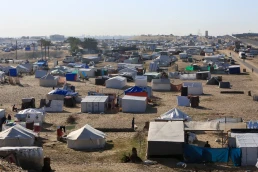To follow the US or not into conflict — that is the question.
by Eldar Mamedov, Responsible Statecraft
As the United States plunges ever deeper into a fresh Middle East conflagration — this time fighting Iran-backed non-state actors, including Yemen’s Houthis and Shiite resistance groups in Syria and Iraq — its closest allies from the EU and NATO stand divided.
These divisions reflect a long-standing failure of the EU member states and institutions to speak with “one voice” on the Middle East.

When the U.S. called for an international coalition to stop the Yemen-based Houthi militias attacks on the international shipping in the Red Sea, only a few European nations signed the joint statement: the UK, Germany, Netherlands, Belgium, Denmark and Italy. Of that initial group, only Britain, Denmark, Netherlands, plus Greece joined as the European contingent of “Operation Prosperity Guardian.”
Others like France, while condemning the Houthi attacks, expressed preference for an autonomous, European-led operation. Still others, like Spain, were skeptical of any involvement in any anti-Houthi action whatsoever.
Recent Posts
Stop Israel’s Dystopian “Humanitarian City” Plan—Before It’s Too Late
July 11, 2025
Take Action Now For the past 20 months, the world has watched—and largely enabled—a genocidal campaign in Gaza. Over 55,000 Palestinians have been…
The “Liberal” International Order Is Criminalizing Palestine Protests
July 11, 2025
Take Action Now As Western governments repress Palestine solidarity and enable Israel’s impunity, the “liberal international order” is no longer…
Politicians Are Betraying Gen Z On Climate
July 10, 2025
Take Action Now While Gen-Zers thrift, knit, crochet, and find other ways to reduce our footprints, Trump and the GOP are greenlighting more climate…
Trump’s Deportation Threat Against Zohran Mamdani Is Shameful
July 10, 2025
Take Action Now In only half a year of Donald Trump’s presidency, he and his allies have turned deportation into an explicitly political threat…




